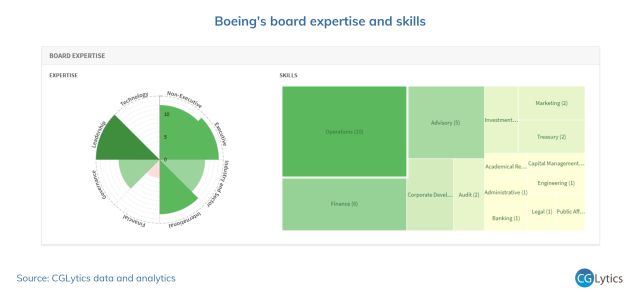This article examines Boeing's corporate governance practices and current expertise on the board. This raises the question if recent changes will really be enough to sharpen Boeing's focus on product and safety going forward.
Disaster strikes
Following the horrific plane crashes of Lion Air Flight 610 and Ethiopian Airlines Flight 302 in October 2018 and March 2019, a mounting crisis faces Boeing. As a result, Boeing has recently received a fair share of negative publicity, been the subject of investigations and named in lawsuits. Beyond the general public, shareholders and corporate governance experts are infuriated. They collectively question the effectiveness and transparency of the board and leadership—with good reason.
Various recent studies have shown Boeing's quality of corporate governance. Findings reveal Beoing ranks near the bottom of all S&P 500 company boards1. Even more interesting is the board's compensation data.
CGLytics data reveals that of all S&P 500 companies, Boeing ranked 91st out of the 500 with the highest paid non-executive directors; receiving an average of $345,000 per director in 2018.
In addition, new developments at congressional hearings held in October 2019 have revealed that many concerns were warranted. Boeing executives admitted to flaws in the design of its 737 Max. Pilot error was originally thought to be the main cause of the plane crashes, however that sentiment has changed and a "pattern of deliberate concealment" 2 is now suspected. Instead of pilot error, it is now alleged that insufficient information provided to the pilots regarding the new changes to the plane caused these unfortunate results. The Boeing CEO stated at the congressional hearings that, until recently, he was unaware of the apparent issues. It seems greater oversight and communication was, and is, needed within Boeing, its executives, and the Board.
Board takes steps to increase safety
We note that Boeing has taken various actions to ensure the future safety of its aircrafts. In August 2019, the board established a permanent Aerospace Safety Committee to assist the board in "the oversight of the safe design, development, manufacture, production, operations, maintenance, and delivery of the aerospace products and services of the Company." Along with the establishment of the committee, the company also formed a Product and Services Safety organization, which is responsible for monitoring safety related events within the company's major businesses. These additional layers of oversight will hopefully strengthen Boeing's safety focus and minimize unfortunate future safety issues on the consumer end.
The board also "amended the company's Governance Principles to include safety-related experience as one of the criteria it will consider in choosing future directors." 3 Following this amendment, the board appointed former Chief of Naval Operations John Richardson, whose prior positions included significant safety experience, as a director. Admiral Richardson, along with Admiral Edmund Giambastiani, appear to be the only director on Boeing's 14-member board that has safety experience in aviation. It also does not appear that the board currently contains directors with technical experience in aviation, except for CEO Dennis Muilenburg who was an engineer for Boeing. This could raise the question whether the board has enough expertise to address, both technical and safety issues, to challenge Muilenburg, who previously held a dual role as Chairman and CEO of Boeing for over three years.

Changes for CEO Muilenburg
In October 2019, Boeing's board decided to remove CEO Muilenburg from his role as Chairman. This action was taken to "enable Muilenburg to focus full time on running the company as it works to return the 737 Max safely to service, ensure full support to Boeing's customers around the world, and implement changes to sharpen Boeing's focus on product and services safety" and to "strengthen the company's governance and safety management processes." 4 It is still unclear, however, whether Muilenburg will receive any pay cut or even resign following his failure to address the 737 Max issues. When asked at the Congressional hearings about whether he would take any pay cut following this mistake, the CEO said: "Our Board will make those determinations."
How Boeing could increase board oversight
Board oversight and transparency is a significant issue in corporate governance. It is important to be aware of board composition, executives, and the information that entails when viewing any company. CGLytics provides necessary data analytics that could lend a useful hand in analyzing boards, their efficacy, and transparency. In this case, a quick look at the board expertise, committee overview and individual profile of each director on the Boeing's board on CGLytics would have drawn attention into the Board's lack of safety committees and technical and safety experience and expertise.
Footnotes
1 https://fortune.com/2019/05/23/boeing-board-governance-experts/
2 Sen. Richard Blumenthal
3 https://investors.boeing.com/investors/investor-news/press-release-details/2019/Boeing-Chairman-President-and-CEO-Dennis-Muilenburg-and-Boeing-Board-of-Directors-Reaffirm-Companys-Commitment-to-Safety/default.aspx
4 https://boeing.mediaroom.com/2019-10-11-Boeing-Board-of-Directors-Separates-CEO-and-Chairman-Roles
The content of this article is intended to provide a general guide to the subject matter. Specialist advice should be sought about your specific circumstances.

